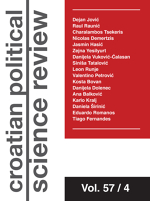Defining Diaspora in post-Yugoslav States
Defining Diaspora in post-Yugoslav States
Author(s): Danijela Vuković-Ćalasan, Siniša TatalovićSubject(s): Cultural Anthropology / Ethnology, Social development, Sociology of Culture, Migration Studies, Globalization, Identity of Collectives
Published by: Fakultet političkih znanosti u Zagrebu
Keywords: Diaspora; Globalisation; Post-Yugoslav Countries; Identity; Ethnocultural Communities;
Summary/Abstract: Contemporary societies exist in the conditions of globalisation, which profoundly transforms them in different dimensions. Technological progress enabled the significant changes in the identity dimension. This has, inter alia, resulted in new opportunities for preserving identification with the country of origin, increased interest in the diaspora concept in the politological and sociological thought and caused new approaches and activities by the states in improving relations with their diasporic communities. The former republics of the SFRY, which have been making p rogress in building legal and institutional capacities for cooperation with diasporas, are no exception. Generally, all of these countries have very numerous and diverse diasporas, which have usually been emerging in a long period of time. This paper analyzes the policies of the states, created by the break-up of the SFRY, towards their diasporas. The policies of these states are specific and they differ from one another, both in defining diaspora and in legal and institutional solutions that should improve diaspora’s link with the country of origin. However, the Republic of Slovenia, the Republic of Croatia, Bosnia and Herzegovina, the Republic of Serbia, Montenegro and the Republic of North Macedonia, have some common elements as well.
Journal: Politička Misao
- Issue Year: LVII/2020
- Issue No: 04
- Page Range: 100-122
- Page Count: 23
- Language: English

